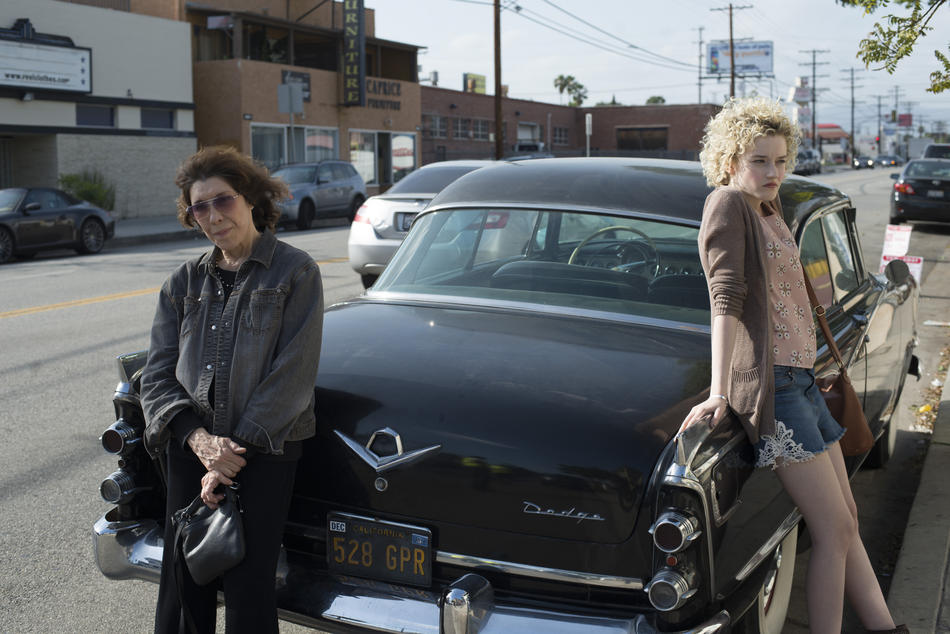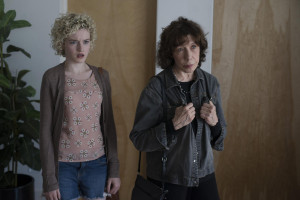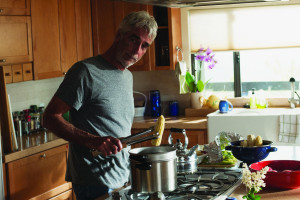 Grandma, as the catch-all title might lead you to expect, is not a portrait of the traditional character of an American grandmother. As the film opens, said grandma, Elle (Lily Tomlin), is breaking up with Olivia (Judy Greer) – the hardened, cutthroat actions of a woman still reeling from the loss of a long-term love, knowing the younger woman is safer away from her cracked heart. Elle cries in the shower after Olivia finally leaves, and already we see the deftness of Tomlin’s performance, laying the foundations for Elle’s sorrow in the coldness of her rejection.
Grandma, as the catch-all title might lead you to expect, is not a portrait of the traditional character of an American grandmother. As the film opens, said grandma, Elle (Lily Tomlin), is breaking up with Olivia (Judy Greer) – the hardened, cutthroat actions of a woman still reeling from the loss of a long-term love, knowing the younger woman is safer away from her cracked heart. Elle cries in the shower after Olivia finally leaves, and already we see the deftness of Tomlin’s performance, laying the foundations for Elle’s sorrow in the coldness of her rejection.
Paul Weitz, again plumbing intergenerational dynamics after it proved so successful in his About A Boy, purposefully works in a minor key here, keeping his focus tight on Elle’s relationship with her ironically-named granddaughter Sage (Julia Garner), who turns up on her doorstep seeking money for an abortion booked for that same day. They journey around the local area as Elle mines her mental rolodex for any favours owed; but while you could call this a road trip, the geography of their journey isn’t typical of one. One of their stops reluctantly involves an acrid confrontation with Olivia, just hours after the break-up. Weitz is detailing a long life, but not a particularly grand one, and the closeness of Elle’s shuttered intimacies are living closer by than she’d ever have admitted.
 Weitz gives Elle a few too many laboured character notes, keen to emphasise her disaffection for normative society, but in some ways this open declaration of the film’s politics is one of its biggest assets: everyone may say Hollywood is liberal, and this might be a film about a lesbian grandmother, but how often do you get a film so openly pro-choice? Grandma is so casual about its liberalism that it barely registers as a potential point of contention, and its slender, relaxed tone belies the boldness of this stance.
Weitz gives Elle a few too many laboured character notes, keen to emphasise her disaffection for normative society, but in some ways this open declaration of the film’s politics is one of its biggest assets: everyone may say Hollywood is liberal, and this might be a film about a lesbian grandmother, but how often do you get a film so openly pro-choice? Grandma is so casual about its liberalism that it barely registers as a potential point of contention, and its slender, relaxed tone belies the boldness of this stance.
Where Weitz really trips up is in his characterisation of Sage. Pre-teen Marcus in About A Boy worked as a character because his function was to act older than his years, but Weitz is clearly estranged from a real understanding of anyone of Sage’s generation. Garner is too muted a presence, especially in the face of Tomlin’s sardonic tones and Marcia Gay Harden’s brusque alienation (as Sage’s mother), and she can’t ever undermine the stereotypical notes of her character. Weitz has gathered an impressive supporting cast – Laverne Cox, Sam Elliott, Elizabeth Peña – and the film’s momentum relies on their sharp interplay with Tomlin, where it should be powered by the familial bond.
 The film’s strongest sequence comes in the sojourn with Elliott’s character. An ex of Elle’s, living alone in an isolated, modernist house, Elliott’s Karl plumbs the deepest wells of regret in Elle. Weitz’s skill at character interplay delicately manipulating Elliott’s typical gruffness for both remoteness and intimidating anguish. Weitz pulls off a similar effect in the scenes with Sage’s mother, though Harden’s brittleness is understandably a little harder to manage. It’s these moments that make Grandma a keeper; it’s just regrettable that Elle’s status as a grandmother becomes a secondary concern in the face of them.
The film’s strongest sequence comes in the sojourn with Elliott’s character. An ex of Elle’s, living alone in an isolated, modernist house, Elliott’s Karl plumbs the deepest wells of regret in Elle. Weitz’s skill at character interplay delicately manipulating Elliott’s typical gruffness for both remoteness and intimidating anguish. Weitz pulls off a similar effect in the scenes with Sage’s mother, though Harden’s brittleness is understandably a little harder to manage. It’s these moments that make Grandma a keeper; it’s just regrettable that Elle’s status as a grandmother becomes a secondary concern in the face of them.
Grandma is in cinemas now.




